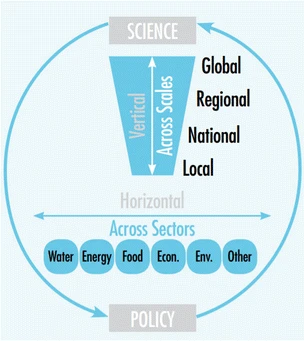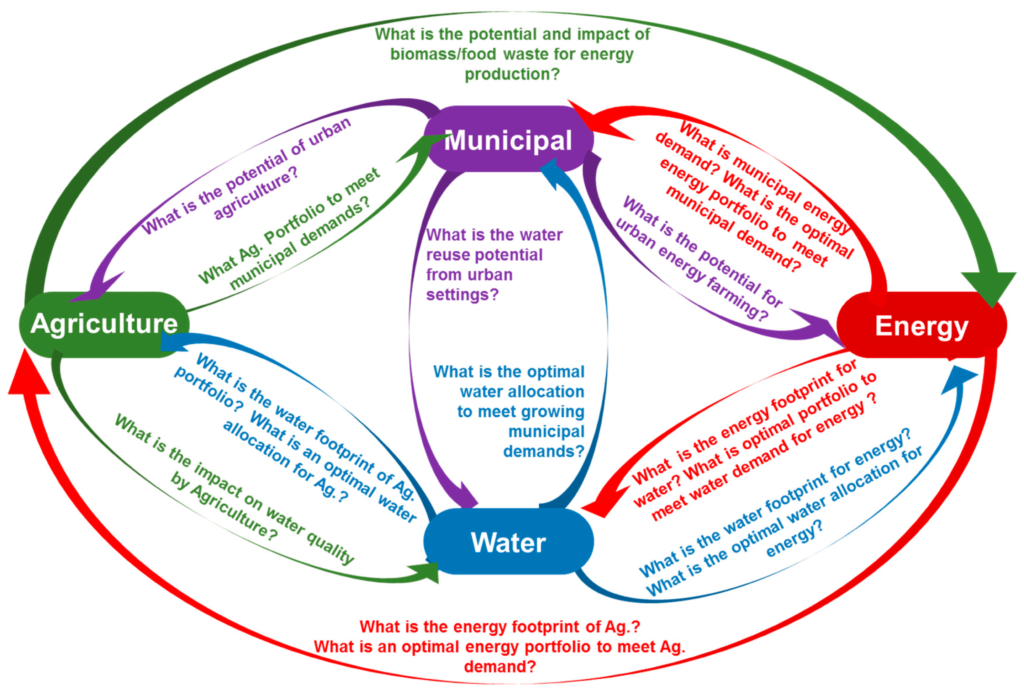Trade-offs and Decision Support Tools for FEW Nexus-Oriented Management

Purpose Existing assessment and decision support tools have limited application to real-world food-energy-water (FEW) Nexus challenges. Integrated assessment approaches are often discipline-specific or highly theoretical, lacking grounding in real-world FEW issues. Recent Findings FEW systems require application of integrated techniques that address multiple attributes of trade-off analyses, dynamic and disparate datasets, and difficult decision contexts. […]
Water–energy–food nexus: a platform for implementing the Sustainable Development Goals

This high- level panel was partially supported by the Texas A&M WEF Nexus Initiative, BMZ, European Union, and respective co-author institutions (American University of Beirut, OCP Policy Center, University of Zaragoza, Global Environmental Facility, Circle of Blue, Stockholm Environment Institute, National Scientific and Technical Research Council, International Commission on Irrigation and Drainage, World Bank, and […]
Developing Socio-Techno-Economic-Political (STEP) Solutions for Addressing Resource Nexus Hotspots

The challenge of meeting increasing water, energy, and food needs is linked not only to growing demands globally, but also to the growing interdependency between these interconnected resource systems. Pressures on these systems will emerge to become hotspots with different characteristics, and will require a fresh look at the challenges existing both within each of […]
Complexity versus simplicity in water energy food nexus (WEF) assessment tools

Approaching water, energy, and food, as interconnected system of systems, as an alternative to traditional silo-based resources planning and management approaches continues to fall short of expectations of its research-backed benefits. The lack of nexus applications in policy and decision making can be related to numerous factors, with the main barrier being the complex nature […]
Economic, social, and environmental evaluation of energy development in the Eagle Ford shale play

This research investigates the relation between water, energy, and transportation systems, using the growing hydraulic fracturing activity in the Eagle Ford shale play region of southwest Texas in which the local water systems and road infrastructure were not designed for the frequent transport of water into the production site and of produced gas and oil […]
Towards bridging the water gap in Texas: A water-energy-food nexus approach

The 2017 Texas Water Development Board’s State Water Plan predicts a 41% gap between water demand and existing supply by 2070. This reflects an overall projection, but the challenge will affect various regions of the state differently. Texas has 16 regional water planning zones characterized by distinct populations, water demands, and existing water supplies. Each […]
ASSESSING THE SUSTAINABILITY OF CROP PRODUCTION IN THE GEDIZ BASIN, TURKEY: A WATER, ENERGY, AND FOOD NEXUS APPROACH

This study assesses the sustainability of crop production system in Gediz Basin, Turkey and develops forward-looking scenarios for optimal utilization and sustainable allocation of its resources using the water, energy, and food (WEF) Nexus holistic systems approach. Gediz basin data for the year 2014 are used to analyze the current situation and to develop future […]
Lessons learned: Creating an interdisciplinary team and using a nexus approach to address a resource hotspot

Moving resource management and allocation away from sectoral silos to a paradigm founded in integration and leveraging cross-sectoral and trans-disciplinary synergies will result in expanded opportunities for economic development and improved social well-being (Mohtar, 2017; Mohtar and Daher, 2017). Interventions to address complex resource challenges must identify opportunities while cognizant of holistic, system level trade-offs […]
Analyzing FEW nexus modeling tools for water resources decision-making and management applications

Social changes such as growing population, urbanization, globalization, and economic growth, compounded with uncertainties due to climate change are expected to result in substantial shifts in the demand for food, energy, and water. Food, energy and water resource systems are tightly interconnected. Addressing challenges facing any of these resource systems requires a holistic understanding and […]
Toward understanding the convergence of researcher and stakeholder perspectives related to water-energy-food (WEF) challenges: The case of San Antonio, Texas

In the past decade, research on interconnected resource challenges has primarily focused on quantifying physical resource interconnections, and there is a growing focus on the social, economic, and policy dimensions of these interconnections. While the nature of the complexity of interconnected resource challenges resulted in emphasizing the need for inter- and trans-disciplinary research and in […]